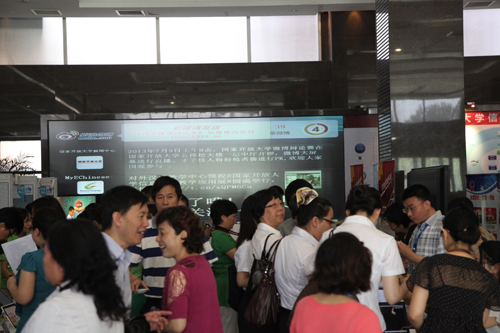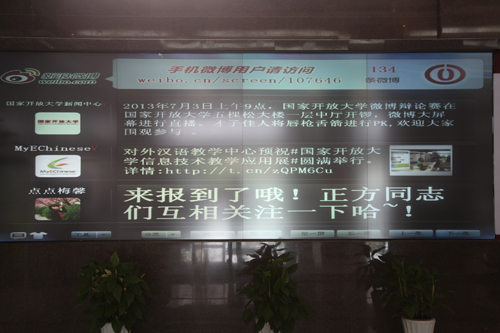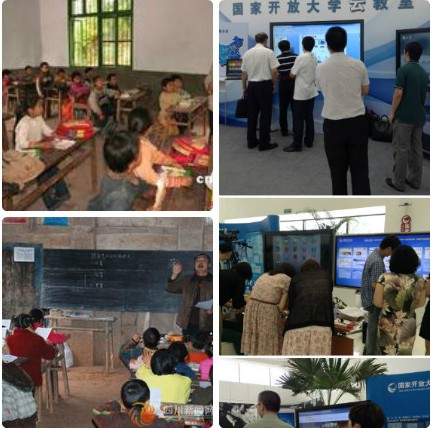On July 3, the Open University of China (OUC) held a Weibo debate competition with the theme of “Will MOOCs take the place of traditional education?” as a part of the Exhibition to Celebrate Phased Achievements at the First Anniversary of the OUC and the Week for Cultural Learning. A total of eight debaters from the proposing team and opposition team
took part in the competition. After a heated debate, the opposing team took the final victory, with the opposition’s third debater Cheng Qian from the Academic Affairs Department winning the award for best debater. The proposing team’s second debater Zhao Dan from the School of Arts and Law won the award for quick wit.
Heated exchanges with ringing phrases instead of swords or tongues!
Young teachers stand out with the help of Weibo
Weibo has provided a platform for audiences to browse interesting information and for publishers to distribute news, opinions and pictures. Nevertheless, a Weibo “debate” remains a novelty. This event, organized by the OUC Department of News and Public Information, is a new attempt by the university to carry out activities based on new media.
The competition was held on the OUC News Center’s official Sina Weibo channel. Each debater published their views on the topic via their own Weibo account in accordance with the requirements and procedures of the competition. The debate was broadcast live on the big screen on the site of the Second Teaching Technology Application Show. The content was also shown on the big screen in the middle hall of the OUC’s Wukesong Building.
The OUC is stepping up its efforts to become a pioneer in promoting education digitization and modernization. Every distance education worker should pay attention to the development of information technology and work hard to explore the best way to incorporate information technology and practical teaching reform. This is especially true of young teachers. The debaters are a newly emerging force from the OUC Information Technology Department, School of Arts and Law, Academic Affairs Department, and the Library, among others. After careful preparation, all of them were eager to put their thoughts into action. They were keen to demonstrate the academic bearing of the OUC’s staff, as well as their advantages as information technology pioneers. The debate competition was reposted by the Information Office of the Ministry of Education’s (MoE) official Weibo channel and the “Sina Open Class” Weibo channel.
Heated exchanges on the topic of MOOCs
Information technology must act as a barometer for the modernization of education. Having proposed “the deep integration of education with information technology”, the OUC and its staff must realize its development by seizing the opportunity presented by the new wave of MOOCs.
The proposing team explained their views based on the statement “MOOCs won’t take the place of traditional education”. They held that MOOCs reduce face-to-face interaction, separate teachers from students, and made it difficult to synchronize teaching and learning, resulting in an “emotional vacuum”. The absence of synchronous encouragement reduces learning enthusiasm. MOOCs cannot meet personalized needs and lack teaching relevancy. Traditional education emphasizes all-round development and constantly strives for perfection in the learner-formation. Teachers are able to give one-on-one tutoring and are more likely to train social elites. MOOCs can be combined with traditional education, but the former will not be able to replace the latter.
The opposing team explained their views based on the statement “MOOCs will take the place of traditional education”. They held that MOOCs are able to cover all the teaching procedures of traditional education, and match or even surpass traditional education in terms of efficacy. Online education also has a number of functions that are not available in traditional education. Convenient and low-cost MOOCs will eventually replace traditional, face-to-face education. The debaters said that technology has been undergoing progress and reforms in the field of education. Having passed from radio, to TV, to computer networks, the next steps are mobile, personal and paperless learning. It is just a matter of time until MOOCs become popular.
During the debate, the debaters presented tightly knit arguments matched with careful logic and witty remarks. The teams’ skillful, yet entertaining debate really impressed the audience.
A little bit of “show” makes the arguments all the more convincing
The third proposition debater, Li Jie from the Academic Affairs Department (Admissions Office), contrasted on-site photos with photos of a rural primary school class
The Weibo debate competition was broadcast live at the OUC Second Teaching Technology Application Show. The debaters used source materials at the scene as arguments for the debate, which made the competition even more attractive.
The third opposition debater, Cheng Qian from the Academic Affairs Department, used a photo of the “cloud classroom” to backup her argument. She argued that looking at the OUC’s education technology should persuade us that, in the future, MOOCs will become more personalized, individualized and highly efficient. The third proposition debater, Li Jie from the Academic Affairs Department (Admissions Office), contrasted photos taken on-site with scenes from a rural primary school class. She pointed out that education conditions in many places in China were still backward, while on the other hand it is easy for us to enjoy education technology on the Wukesong Building. As a result, it will be hard for MOOCs to replace traditional education.
Some of the debaters also took part in the Second Teaching Technology Application Show. The first proposition debater, Wu Shuping from the Information Technology Department, and the Research and Development Centre for the Integration and Application of Digital Learning, demonstrated applications such as the “Cloud Note Coordination For Management” application and the Kindle. The first opposition debater, Ye Chao from the Library, showed off the “Ubiquitous Reading: New Mobile Media of Digital Library” application. All these materials provided rich theoretical and practical foundations to the debate.
The panel of judges, consisting of Secretary Li Ling as chairman, along with Deputy Secretary Zhang Shaogang of the OUC CPC Committee, former Vice President Sun Lvyi, Xiong Yingjin of the Department of News and Public Information, and Deputy Director of the President’s Office Ma Ruolong, believe that the development of MOOCs is both an opportunity and a challenge to higher education. The debaters have a good understanding of the topic for the debate and their wit and wisdom have been reflected in their broad horizon of knowledge and quick response, which has also embodied the vitality of the OUC youth. The debaters have shown great dedication by taking time out from their tight work schedule to take active part in the debate, something for which they should be applauded.
The OUC News Center official Weibo channel was launched in 2011 and has since become an important part of the OUC’s publicity platform. It plays a role in facilitating the public’s understanding of the OUC, establishing the image of the university, and improving the popularity and reputation of the university. During the First Teaching Technology Application Show in 2012, the Department of News and Public Information trialed a live broadcast of Weibo activities with good results.
Photo of the debaters
By He Jing, the OUC




